

TrustCloud — Regulations and the Sharing Economy. Shoshana Zuboff on the Sharing Economy. I.
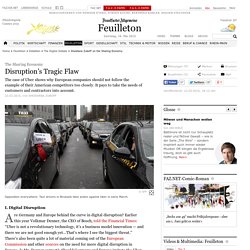
Digital Disruption Are Germany and Europe behind the curve in digital disruption? Earlier this year Volkmar Denner, the CEO of Bosch, told the Financial Times: “Uber is not a revolutionary technology, it’s a business model innovation — and there we are not good enough yet…That’s where I see the biggest threat.” There’s also been quite a lot of material coming out of the European Commission and other sources on the need for more digital disruption in Europe. Is Mr. (German translation: „Die Vorteile der Nachzügler“ von Shoshana Zuboff) Shoshana Zuboff on the Sharing Economy. How Uber and the sharing economy could pave the way for worker-owned companies. The rise of the "sharing economy" — Uber, Feastly, Airbnb, and the like — has been causing some consternation as of late.
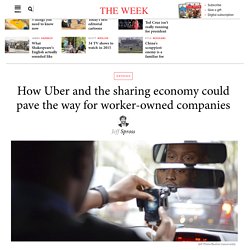
One complaint is that these companies are competing unfairly: Their business model allows them to skirt the regulations that apply to traditional taxi or restaurant companies. Another complaint is more subtle, but more frightening: that these technologies are exacerbating inequality and driving us towards a "servant" economy, where large pools of poorly paid and economically insecure workers will spend their lives providing all manner of petty services for the well-heeled elite. Pascal-Emmanuel Gobry laid out the grim logic succinctly: The efficiency gains of connecting workers to customers via the internet applications will drive down prices and thus incomes, while the new profits created will all get sucked up by the small group of Silicon Valley companies that created the platforms, along with their shareholders.
More Perspectives James Poulos. Sharing the Future Consultation - Andrew Leigh MP. The Big Question With Uber, Airbnb And The Rest Of The `Sharing Economy': Who To Sue? Don't let the sharing economy of Uber, Airbnb become the scofflaw economy. Say “underground economy,” and what do you think of?
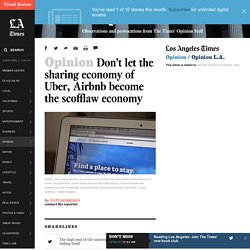
Low-wage workers, some of them here illegally, toiling away in the shadows for bosses who may pay them a less-than-legal wage under the table, and who dodge paying the taxes on those wages. Right? But now the headlines are about the other end of the underground economy, which isn’t hiding anywhere but flaunting itself.
Big money is changing hands, and it seems that none of it going to pay the taxes and fees that it should. Ride-sharing, room-sharing -- how about responsibility-sharing? A California state senator, a Sonoma County Democrat, wants to give cities the authority to collect taxes from people who rent private rooms and even houses through online services like Airbnb. Piggy Baggy to revolutionize sharing economy. The frequently used expression piggyback lends itself to a whole different meaning with Harri Paloheimo, the founder of the Piggy Baggy service and CEO of Coreorient Oy.
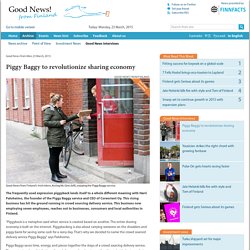
This rising business has hit the ground running in crowd sourcing delivery service. This business now employing seven employees, reaches out to businesses, consumers and local authorities in Finland. “Piggyback is a metaphor used when service is created based on another. Uber 911 — Thought Bubbles. In New York City, the median response time for an ambulance is 6.1 minutes.
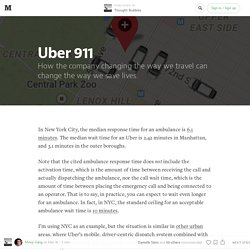
The median wait time for an Uber is 2.42 minutes in Manhattan, and 3.1 minutes in the outer boroughs. Note that the cited ambulance response time does not include the activation time, which is the amount of time between receiving the call and actually dispatching the ambulance, nor the call wait time, which is the amount of time between placing the emergency call and being connected to an operator. That is to say, in practice, you can expect to wait even longer for an ambulance. In fact, in NYC, the standard ceiling for an acceptable ambulance wait time is 10 minutes. What the Sharing Economy Takes. Sharing is a good thing, we learned in kindergarten, but that wisdom was soon called into question by the grown-up world of getting and spending.
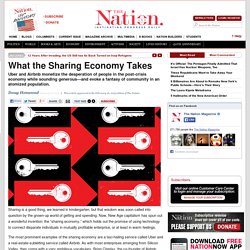
The sharing economy: five Orlando co-working spaces. Small business owners often face an early stumbling block: At a certain point, a table at Starbucks or the corner of the couch just won't cut it anymore.
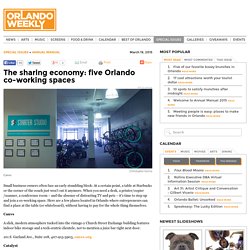
When you need a desk, a printer/copier/scanner, a conference room – and the absence of distracting TV and pets – it's time to step up and join a co-working space. Here are a few places located in Orlando where entrepreneurs can find a place at the table (or whiteboard), without having to pay for the whole thing themselves.
Canvs A slick, modern atmosphere tucked into the vintage-y Church Street Exchange building features indoor bike storage and a tech-centric clientele, not to mention a juice bar right next door. 101 S. Catalyst. Why I May Drop Out of the Sharing Economy. I started the year with a fun goal: To partake more in the sharing economy.
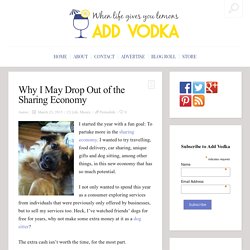
I wanted to try travelling, food delivery, car sharing, unique gifts and dog sitting, among other things, in this new economy that has so much potential. I not only wanted to spend this year as a consumer exploring services from individuals that were previously only offered by businesses, but to sell my services too. Heck, I’ve watched friends’ dogs for free for years, why not make some extra money at it as a dog sitter?
La sconveniente verità per le start-up: il lavoro si paga. In collaborazione con BOOK PRIDE, un contributo in vista dell’incontro SHARING, COWORKING E MUTUALISMO: IL LAVORO DELLA CONOSCENZA SI AGGREGA.
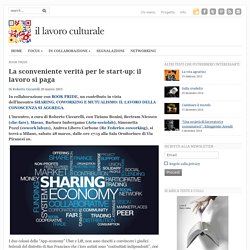
L’incontro, a cura di Roberto Ciccarelli, con Tiziano Bonini, Bertram Niessen (che-fare), Macao, Barbara Imbergamo (Acta-sociolab), Simonetta Pozzi (cowork lab121), Andrea Libero Carbone (Re Federico coworking), si terrà a Milano, sabato 28 marzo, dalle ore 17:15 alla Sala Ornitorinco di Via Piranesi 10. I due colossi della “App-economy” Uber e Lift, non sono riusciti a convincere i giudici federali del distretto di San Francisco che i loro autisti sono “contrattisti indipendenti”, cioè freelance ingaggiati a richiesta o su commissione per guidare i loro taxi.
Tiziano Bonini. C’è Sharing e sharing. Negli ultimi mesi ho preso in affitto una casa su Airbnb per pochi giorni, ho ascoltato musica su Spotify, ho usato solo la bici gialla del comune di Milano, ho preso un passaggio da Milano a Firenze su Blablacar, ho affittato per pochi minuti un’auto con Car2Go, ho chiamato un autista di Uber una notte che pioveva e ho finanziato un documentario attraverso una piattaforma di crowdfunding online.
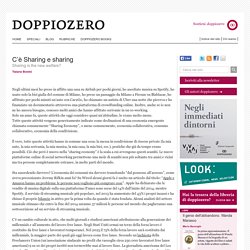
Inoltre, anche se io non ne ho ancora bisogno, conosco molti amici che hanno affittato scrivanie in un co-working. Solo un anno fa, queste attività che oggi considero quasi un’abitudine, lo erano molto meno. Tutte queste attività vengono genericamente indicate come declinazioni di una economia emergente chiamata comunemente “Sharing Economy”, o meno comunemente, economia collaborativa, consumo collaborativo, economia della condivisione. Condividere e collaborare: l'età della sharing economy. The Blog Of Arthur T. Corry - THE SHARING ECONOMY & UNBUNDLING OF (formerly)... Interest is Rising in Cooperative Alternatives to the "Sharing Economy"
Trebor Scholz, Sara Horowitz, Nathan Schneider, Saket Soni, Caroline Woolard, Douglas Rushkoff (l-r) at Civic Hall If last week's turnout at Civic Hall is any indication, a lot of people--technologists as well as organizers--are interested in figuring out how the 21st century economy can be built on more cooperative and less exploitative principles than the libertarian "gig economy" exemplified by companies like TaskRabbit and Uber. “Sharing economy” shams: Deception at the core of the Internet’s hottest businesses.
“Sharing is the new buying.” The title of technology analyst Jeremiah Owyang’s survey of the sharing economy was exquisitely designed to grab attention: It was released just before the start of SXSW Interactive, the annual orgy of techie self-congratulation held every March in Austin, Texas. It boasted a clever, cognitively disjunctive twist: Sharing? Buying? Aren’t they opposites? And in an era of unlimited hype, it tabulated real data, reportedly “engaging 90,112 people in the US, Canada and the UK” to discern how and why they were embracing services like Lyft and Airbnb and Yerdle. The study’s findings make for interesting and useful reading for anyone tracking the rise of what is called “collaborative consumption” — the proliferation of services that allow us to rent out our spare rooms and cars and junk gathering dust in the garage.
What, I wondered, would a Kwakiutl chieftain make of the sharing economy? But there’s also an overlap of rhetoric. This is an extraordinary claim. Economix.blogs.nytimes. Arun Sundararajan is a professor and NEC Faculty Fellow in the Stern School of Business at New York University, where his research studies how digital technologies transform business and society. His research has been supported by organizations that include Google, IBM, Microsoft and Yahoo. A variety of Internet-enabled platforms for peer-to-peer commerce seem to be under regulatory siege.
If settlement talks fail, Airbnb is heading to court to challenge a wide-ranging subpoena for New York City host information issued by the New York State attorney general. The urban transportation platforms Uber, Lyft and Sidecar have battled regulators in numerous cities – for instance, Sidecar left New York last spring after a sting by agents of the Taxi and Limousine Commission during a pilot program in Brooklyn led to the impounding of a driver’s car.
It’s not as if today’s city and state regulations are fundamentally flawed. There is a solution to this regulatory conundrum. The Cybercommunist Manifesto. Richard Barbrook is causing trouble again. In his latest manifesto, “Cybercommunism,” Barbrook argues that all those free-software hackers blissfully giving away their code on the Internet are actually “superseding capitalism” and “successfully constructing the utopian future in the present.” Just as Karl Marx predicted. OK — maybe Marx did not exactly foresee the rise of the high-tech gift economy, but it’s kind of fun to imagine that he might have. (originally published in December 1998) Special Issue Update This paper is included in the First Monday Special Issue #3: Internet banking, e-money, and Internet gift economies, published in December 2005.
Special Issue editor Mark A. Fox asked authors to submit additional comments regarding their articles. The Hacker Milieu as Gift Culture. To understand the role of reputation in the open-source culture, it is helpful to move from history further into anthropology and economics, and examine the difference between exchange cultures and gift cultures.
Human beings have an innate drive to compete for social status; it's wired in by our evolutionary history. For the 90% of hominid history that ran before the invention of agriculture, our ancestors lived in small nomadic hunter-gatherer bands. Chapter 1: Boot Time. How “Candy Crush” is ruining the economy. Anyone who has played the game “Candy Crush Saga” for more than a few minutes has probably, at least on a subconscious level, grappled with the bankrupt soul of modern video-game capitalism. In the so-called free-to-play world, it’s hard to think of another game developer that has more successfully mastered the marketing coup that merges addictive game play with powerful incentives to regularly fork over cold, hard cash.
Yerdle goes national with battle cry of ‘share, not shop’ Yerdle, an online store that wants to be the eBay of the sharing economy, is expanding beyond its initial markets and going national. Adam Werbach Launches yerdle on Black Friday with 10,000 Free Items. Yerdle. How the Facebook economy is costing us big. On Feb. 12, San Francisco’s Yerdle, a start-up whose mission is to help you unload the unused goods gathering dust in your closet, announced it was going national.
Fist-bumping while Rome burns: The seduction of Silicon Valley disruption. I fist-bumped my first Lyft driver last Thursday night, on my way to a foodie networking party in San Francisco’ SoMa district at which you could make your own bitters and every other guest seemed to have a part-time hobby brewing artisanal small-batch whiskey. And I wondered: Am I a character in my own parody? Did Dave Eggers write my evening? Or was it Gary Shteyngart? Report: Sharing is the New Buying, Winning in the Collaborative Economy. How Data Can Enable Business Disruption: Traditional Retailers Must Take Note Of The Sharing Economy. Recently, I talked with the CEO and founder of reBuy about the shifting dynamics in the retail sector as a result of digitalization. Four business opportunities that remove barriers to the sharing economy. Pet-Sitter startups may be next success in sharing economy. The Next Generation Sharing Economy.
4 Sharing Economy Trends in 2015. Comment: The sharing economy - how another technological 'saviour' is failing us. What We Know About the Global Sharing Economy. Nuvola.corriere. Uber Takes Strategic Investment From Times Internet To Boost Its Visibility In India. La sconveniente verità per le start-up: il lavoro si paga. Share and Share Alike? Considering Racial Discrimination in the Nascent Room-Sharing Economy - Stanford Law Review. The Business of Sharing: Making it in the New Sharing Economy - Alex Stephany.
How the 'Uber effect' is changing work. Uber, Lyft Lawsuits Could Spell Trouble For the On-Demand Economy. Uk.businessinsider. Giudizi pesanti a un locale su TripAdvisor: tre indagati per diffamazione. Uber Suspends Its UberX Service In South Korea. Circular Economy. Circular economy. MyTwinPlace Is Like Airbnb For Housing Swaps. How the sharing economy is changing the value of ownership. Torino, tassisti in rivolta contro Uber. Assalto all'Authority dei Trasporti. Share My Jet: Can XOJet Join Uber and Airbnb In The Sharing Economy? Files/Capitalism_3.0_Peter_Barnes.pdf. Businessinsider. Friday Roundup: Uber Cuts Rates in 48 Cities. Dealbook.nytimes. Uk.businessinsider. The new way to stay in a city. Explicit cookie consent.
Airbnb's legal troubles: what are the issues? Airbnb to be legalised in London. Measures to boost sharing economy in London. The Future Of The Sharing Economy Depends On Trust. Keep Driving - Peers. What Happens To Uber Drivers And Other Sharing Economy Workers Injured On The Job? Hookers turning Airbnb apartments into brothels. Lyft Guts Luxury Service, Sticking Drivers With $34,000 Custom SUVs. Uber’s program to help you buy a car sounds like a sweet deal. But it’s actually really risky.
Uber: The Driver Roadmap. The dark side of ‘sharing economy’ jobs. Cohousing: The real sharing economy at its best, and a great example in Berlin. PSS: Cohousing. Virtual Assistants, Writers, Marketing assistants and more. Ziptask - Fully Managed Outsourcing. Game Changers. Sharing Revolution. Sharing economy. 5 Things You Never Knew About the Sharing Economy. Peer-to-Peer Lending & Loans. B-cycle - Home.
Europe's largest carpooling network: Home. Car Sharing: An Alternative to Car Rental with Zipcar. Zilok Explained. BookMooch: trade your books with other people. A ride whenever you need one - Lyft. City-to-city carpooling company BlaBlaCar launches in India. Peeing My Way Around New York City With Airpnp, The App For Bathroom Emergencies - BuzzFeed News. How The Sharing Economy Will Impact Marketing. TaskRabbit connects you to safe and reliable help in your neighborhood. Los Angeles may ban app's users from selling parking spots. Je Suis Charlie app quickly hits App Store after email to Tim Cook. Sharing Your Heartbeat Over Apple Watch Is the New Sexting. Uber looks to start fresh in Europe. Homejoy. Free gifts and positional gifts.